Books in Brief
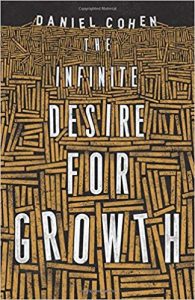 The Infinite Desire for Growth
The Infinite Desire for Growth
Daniel Cohen
Princeton 2018, 165 pp., h/b.
The author is Director of the Economics Department at the Ecole Normale Superieure in Paris, so this book has been translated from French. As such, it draws on French as well as English and US sources, something one rarely finds the other way round. It is a stimulating book of wide scope drawing on a range of disciplines. Starting from the premise that economic growth and the hope of better things to come embodied in the Enlightenment idea of progress is the religion of the modern world, the author traces our history and key turning points in our development including agriculture, persisting hierarchies, the invention of money, the industrial and scientific revolutions, and the emergence of autonomy and free expression. Along the way, he contrasts Western with contemporary Chinese empires, observing that Western powers were in a state of permanent war in building empires and exploiting resources. Our economic development has permitted a population explosion, but we are in the process of going through a demographic transition to stable levels thanks to the education of women and influential examples widely seen on TV.
Questions around labour, productivity, automation and wages are very current, especially since 2008. Here the author takes a rather longer view, showing how middle-class incomes have been stagnating over the last 40 years, and pointing out growth may be underestimated due to the widespread provision of free services over the Internet. Ecologically, we have entered the Anthropocene era but still with our old mentality of separate nation states and their interests. The author takes the view, which I share, that humanity is not yet up to the task of solving global ecological issues and that sufficiently far-reaching collective action is unlikely solely through evoking risks to the planet. We therefore need to rethink progress and look for successful social models such as Denmark. The key issue here is what the author calls the extraordinary malleability of human desire in the light of the Easterlin paradox: first, that wealth does not correlate well with happiness, and secondly, that while a higher salary is obviously desirable, ‘yet once we have reached that target, it is never enough’ due to habituation and comparing ourselves with others. Our needs are relative, and we don’t want to fall behind our neighbours. Moreover, even while the planet strains under the collective human impact, millions of people aspire to Western lifestyles, for which we would need the resources of four planets.
In view of this situation, one has to ask how likely it is that the author’s desirable recommendation of a transition from quantity to quality will occur. This is all very well in advanced countries, but even there people are unwilling to give up what they already have. However, there is increasing support for moves away from GDP towards a focus on well-being. He thinks that attitudes are transformed ‘when individual aspirations and social needs converge towards the same goal’ (p. 152), which entails a new sense of community and solidarity, moving from individual and social levels to that of the species and the planet. Ecological thinkers have already arrived there, but most economists and politicians lag behind – hence the race between education and catastrophe. This book is a thoughtful wake-up call that helpfully contributes to our education and potential transformation.
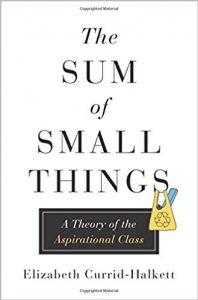 The Sum of Small Things
The Sum of Small Things
Elizabeth Currid-Halkett
Princeton 2017, 254 pp., h/b.
In 1899, the Norwegian economist Thorstein Veblen published his book Theory of the Leisure Class, where he coined the phrase conspicuous consumption. The author reflects on and updates these trends with her idea of the aspirational class as one highly educated and defined by cultural capital rather than income bracket – people whose values and lifestyle lead them to buy organic heirloom tomatoes from the farmers’ market and breastfeed their babies. These are examples of ‘inconspicuous consumption’, and this class uses its income to pay for domestic help, educational advantage and private yoga or music lessons – all of which passes on the cultural capital in terms of advantage and is therefore a trend against equality of opportunity. A telling example is the use of the phrase ‘kitchen supper’, which implies that you also have a dining room that you use on more formal occasions. Indeed, the dinner party and its fashionable topics of conversation also implies a certain background, and our upbringing is manifest in terms of how we hold our cutlery and whether or not we put milk into our tea before or after pouring the tea – apparently this was originally due to the poor quality of crockery used by less privileged people.
The analysis draws on original research, with many informative graphs and tables. Some products like Ballet Slippers nail varnish – a new one on me – are not expensive but reflect the underlying assumption that it is natural to look after one’s nails. Then there is conspicuous production, for instance choosing fair trade and ethically sourced coffee. In deciding where to place a new store, the main criterion for Whole Foods is apparently the density of college graduates within walking distance. These graduates are educated and informed, and this is reflected in their shopping habits, as implied above – another example would be the choice of an electric or hybrid car. Interestingly, the middle class spends more as a percentage of income on conspicuous consumption than the top percentiles, which reflects the extent to which previously exclusive products have become widely available. However, the author also highlights the caveat that income level and happiness are not correlated beyond an annual $75,000. She concludes by observing that these lifestyle choices are simply not an option for huge segments of society and that there is an element of narcissism in the aspirational class whose habits reveal who they are.
 River of Life, River of Death
River of Life, River of Death
Victor Mallet
Oxford 2017, 316 pp., h/b.
Victor Mallet is an FT journalist who is based in New Delhi between 2012 and 2016, which gave him a chance to research and write this brilliant and fascinating book about the Ganges, covering, as Lord Stern observes, history, geography, environment, politics and religion. The title indicates the thesis, also passionately advocated by Swami Saraswati that if Ganga dies, India dies. If Ganga thrives, India thrives. The lives of 500 million people are not a small thing. In his view, it will be a journey from filth to faith. It is striking to read historical accounts when the river was much less polluted than it is now, but it turns out that its sacredness and the purity associated with this is one paradoxical factor that has held back the necessary action to clean it up. The scale of the challenge is daunting, especially in view of continued population increase (300 million in 1947, 1.3 billion in 2016 and a projection of 1.7 billion by 2050) and the chronic lack of proper sewage and toilet facilities with severe pollution implications for every river, not just the Ganges. Population pressure also impacts water supply, and the author demolishes the argument for a demographic dividend. He discusses parallels with the cleaning up of the Thames and the Rhine, but the challenge of the Ganges is an order of magnitude greater, as Prime Minister Modi realises. Not only the essential cleanup, but also the fact that 70% of the flow of Ganges consists of meltwater from the Himalayas, where the glaciers are in the process of disappearing. The author has performed a great service by highlighting the scale of the problem as well as conveying the overall significance of the Ganges for India and its future.
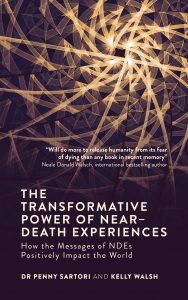 The Transformative Power of Near-Death Experiences
The Transformative Power of Near-Death Experiences
Dr Penny Sartori and Kelly Walsh
Watkins 2017, 256 pp., p/b.
I read the manuscript of this remarkable collection of transformative near death experiences a few months ago and found it a powerful and transformational read. The many different accounts converge on some key themes of self-love, acceptance, forgiveness and renewal. Underlying all this is the realisation of Oneness and deep interconnectedness characteristic of love. This is exactly the experience and message of the well-known books by Anita Moorjani and Eben Alexander, both of whom endorse the book. There is a foreword by Mick Collins, whose new book I have also endorsed and who sees the content of this book as a love letter from God. Then there is a profound prologue by Neale Donald Walsch: his own experience converges with the core message of the book: ‘I am not my body, I’m totally loved and absolutely perfect just as I am, I am one with everything, and everything is really simple. The reality of an interpenetrating spiritual world shines through the narratives and we are reminded that a deep intuitive knowledge is available to all of us. Ultimately, this involves a re-identification with a deeper aspect of the self and the realisation that there is no separation between us. Although such messages have appeared in previous books, including my own Whole in One and Lessons from the Light by Kenneth Ring and Evelyn Elsaesser, the appearance of this book is particularly timely view of the widespread search for meaning. Readers cannot fail to be deeply touched by these narratives.
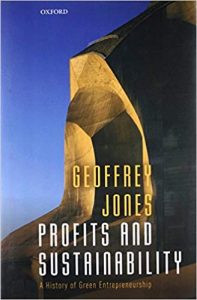 Profits and Sustainability
Profits and Sustainability
Geoffrey Jones
Oxford 2016, 442 pp., h/b.
This engaging and authoritative history of green entrepreneurship shows that its origins go far further back than most readers will realise, to the mid-19th century. The author traces the often eccentric lives and ideas of green pioneers in organic food, vegetarianism and energy, including Rudolf Steiner, who impacted food, agriculture, medicine and design. Wind energy in its modern form goes back to the 1850s, and by the end of the First World War Denmark had 250 electricity producing wind turbines, while the first solar company was formed in 1892. The book proceeds chronologically through the 1930s to 1950s, then to the rise of green business in the 1970s, including recycling and ecotourism. Since the 1980s, the growth of green businesses has been accompanied by a major shift in attitudes towards the natural environment and a corresponding proliferation of green institutions and certifying agencies. Another chapter is devoted to green finance, such as the Triodos Bank, and government initiatives, then the features and limits of corporate environmentalism. Many of the original green entrepreneurs were motivated by romanticism, but they were also the historical originators of a sustainable world for the future. Reverting to the title, the author concludes that profits and sustainability have been hard to reconcile but the whole process has brought into the foreground the need to address major ecological issues and redirect policy, especially in relation to food, agriculture and energy.
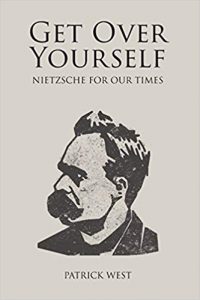 Get Over Yourself – Nietzsche for our Times
Get Over Yourself – Nietzsche for our Times
Patrick West
Imprint Academic 2017, p/b.
As the subtitle indicates, this book is not just another introduction to Nietzsche, but rather a thought experiment in how he would respond to our digital era of identity politics, therapy culture, religious fundamentalism and envy politics. His influence on leading 20th-century thinkers has been immense, and the author characterises him as a prophet of moral revolution advocating the destruction of everything decadent and life-negating while preaching liberation, originality, reinvention and self-creation. Everywhere he challenged prejudices and received opinions, urging us to transcend ourselves and live dangerously. The first chapter gives an account of his life, which is followed by a series of chapters identifying and criticising contemporary cultural themes: it is invigorating stuff. It is fascinating to learn that the First World War pushed sales of Nietzsche’s books to new heights, with 140,000 copies of Thus Spake Zarathustra sold in 1917 alone. He advocates individualism without narcissism, involving action and perpetual striving in a process of self-overcoming; he prefers struggle to happiness, freedom to safety, nobility to conformity – all of which requires courage. One cannot envisage him liking posts or the artificiality of much digital communication. The book shows how he can act as a tonic and inspiration to live our lives to the full and without fear.
 Spiritual Science in the 21st Century
Spiritual Science in the 21st Century
Yeshayahu Ben-Aharon
Temple Lodge Press 2017, 297 pp., p/b.
Ben-Aharon is a spiritual scientist, philosopher and social activist living in Israel, who is also the co-founder of the Global Network for Social Threefolding. The book consists of 13 lectures given in the arts of the world from 1997 to 2012 on a wide variety of topics: spiritual science in contemporary philosophy, changing self-love into world thinking, the working of Christ in apocalyptic conditions, Israeli civil society and the global melting pot of the clash of civilisations, the global initiation of humanity and education. The author is exceptionally well informed across a number of disciplines, and an important consideration is the spiritualisation of thinking, taking as a point of departure Steiner’s Philosophy of Freedom, ultimately representing not analysis but transformation, and wrestling with the riddle of spiritual nature of the human being in relation to the problem of immortality. The author shows himself a realist in political terms and has no illusions about the current world order with its pragmatic power-seeking. However, he has faith in the ultimate power of love and talks about a spiritual rather than technological singularity when we finally identify with our higher nature. In addition, we can transcend narrow nationalism by embracing our identity as global citizens and transform our educational systems so that people take more responsibility for our collective future. A stimulating volume.
 The Buddhist Voyage beyond Death
The Buddhist Voyage beyond Death
Ven Master Hsin Tao
Cambridge Scholars 2017, 150 pp., h/b
I imagine that few readers will have heard of the work and teaching of the Chinese Buddhist monk Hsin Tao, but this book is a real jewel. Born in 1948, Hsin Tao put himself through an intensive training, including two years in a cave and meditating in a graveyard. This is not for the fainthearted. The fundamental truths of Buddhism are clearly articulated – suffering, emptiness, impermanence – but also the cultivation and promotion of self-less-ness and goodness. Life and death alternate as we are reborn in new though impermanent forms with opportunities for further transformation: ‘death and rebirth is one thing. Death itself means the rebirth of life’. (p. 39) Hsin Tao translates some teachings into modern metaphors, for instance the memory matrix and the idea that death is a change of channel. It is this memory matrix that is reborn, and we are constantly sowing new seeds as thoughts as we create and recreate ourselves. Individual lives are like files or folders.
He has a very interesting teaching on time and space, which he says appear different at first sight but in the end are not so different: ‘space is unmoving time and time is moving space.’ We can easily get caught up looking at changes in time, ‘rather than looking at the stillness of space, an unmoving space…. which is also emptiness.’ This sense of emptiness and spaciousness seems to correspond to pure consciousness. The first part is devoted to deathless spirituality, then the second to death and dying, and the third to the creative now. Some of the valuable teaching about death and dying is given in the form of a dialogue, along with the lessons in detachment that we will have to undergo. Hsin Tao emphasises the importance of preparing for death, which few of us address. In his view, meditation is a key preparatory practice that can also bring us to a state where our mind is more ordered and less fluctuating. This means that we will be able to face death with greater equanimity. The ultimate development is that of the bodhisattva embracing all sentient beings. This is precious teaching for our time.






